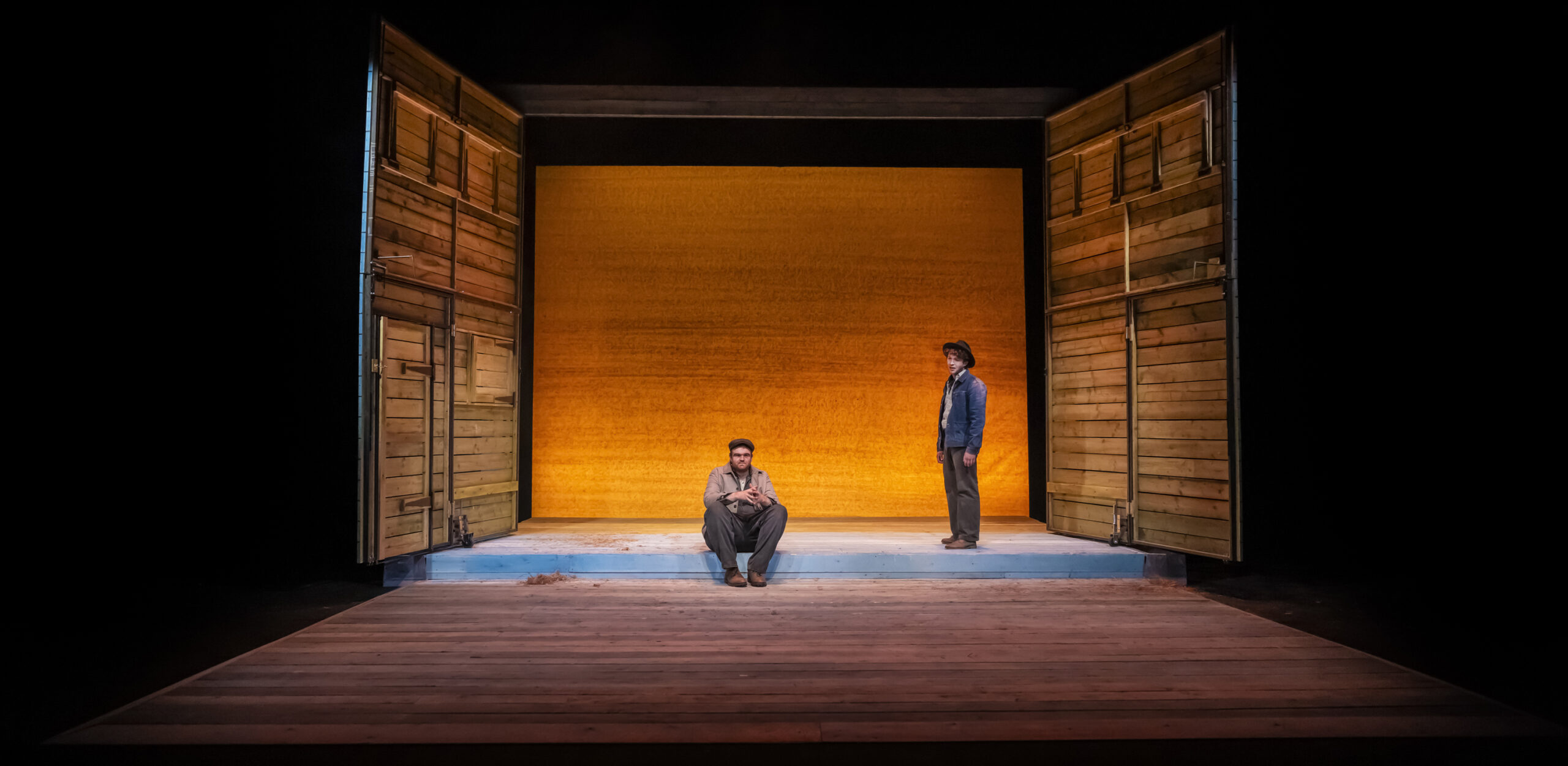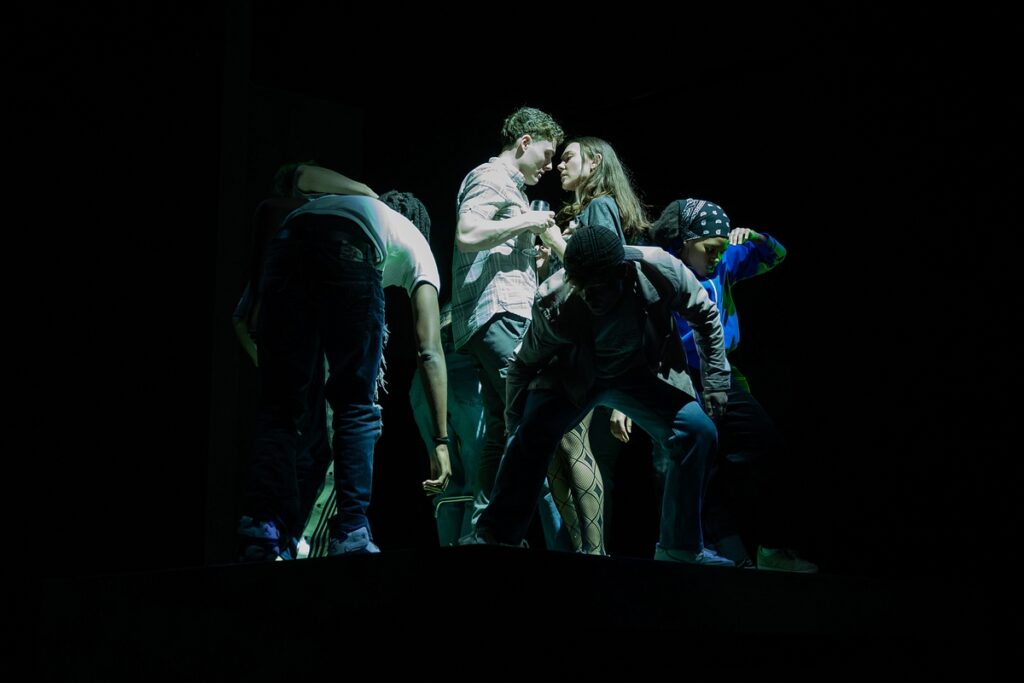
Q&A with Stephen Leach & Zach Hawkins
Stephen, what was the inspiration for Can’t Wait to Leave?
Stephen: I’d had the idea of the character of Ryan for ages – someone a bit broken, disconnected from the world in many ways, but still quite cocky and hungry for approval. I felt like I had to stop and listen, and from there it was just a matter of finding out what happened to him to make him that way.
The play in its current form started with Ryan being left on his own in London after having just arrived. My extended family live all over the country so the notion of just picking up and starting over in a new place has always been something that felt conceivable on a personal level – but of course it’s a hugely difficult and daunting thing for a lot of people to consider. So many stories about people moving to new and unfamiliar places have them quickly finding their feet and enjoying immediate success – I was interested in exploring the other side of the coin and showing what happens when someone fails to adjust and things don’t work out so well.
A lot of Ryan’s character came out of that scenario. He hates London and big cities in general, he’s completely unsure of what he wants to do with his life, and hasn’t had much in the way of education or guidance. Part of what prompted me to make this a solo play was the ability it gave me to thoroughly examine his motivations; to delve into his background and explore all the different aspects of his life.
Has your vision for the production changed from that inspiration?
Stephen: I’m not certain how much it’s changed overall but it’s certainly evolved – I went through a lot of drafts writing the show so various elements have dropped in and out. When I started I had no idea what Ryan’s family and home life were like and those things took their time to fully form – and even in the finished play there’s a lot left unsaid, even if I have my own ideas about them. Zach and I spent quite a bit of time talking about a lot of those factors – what we think the context for certain things might be, and more importantly what audiences might think. Part of what makes this process so interesting is all the layers you add on to a character or a situation that come out of discussions and deciding how you’re going to play a certain scene.
Is there a satisfaction in being both writer and director, seeing the full creative process through from that first draft to the piece being alive on stage?
Stephen: Absolutely! I think because this is such a special project to me, being my first major project, I had to see it all the way through myself. I feel like I’d have been gutted to see it in someone else’s hands. Hopefully if I write anything else I’ll be more willing to relinquish it. But as mentioned, I had a fairly strong vision in mind and it’s been great to be able to nurture that and be the one to guide it as it’s taken shape.
But there’s value in having other voices present in any creative process so I’ve tried to make that the case as much as possible. I had several early readers who helped tighten up the script as well as a couple of people who lent a hand during the casting process and with things like music and lighting.
Zach, what were your initial thoughts when you first read Stephen’s script?
Zach: My first reaction was how much I love the journey of Ryan. The script treats its audience with real intelligence and there is a subtlety and depth to all the characters that is extremely refreshing. I was also really compelled by how it dealt with the nature of bisexuality, which I’ve yet to see accurately represented to this extent: as its own culture, with its own challenges and complexities.
What can you tell us about Ryan as a character?
Zach: Ryan is a flawed, funny, confused, but ultimately good young man. He is at a crisis point in his life and just trying to deal with what comes at him as best he can. His humour is always present, but from the very start you can see hints of the lonely boy dying for connection. I immediately fell in love with the character, and I think the audience will too.
Have there been any particular challenges in bringing Ryan to life?
Zach: I think given the nature of Ryan’s journey, it can often difficult to watch a character you like make so many wrong choices. My hope is that we can show the audience why Ryan feels as though he has to make the decisions he does, and how they are all steps that lead to his eventual growth into a man.
How do you both think audiences will react to Can’t Wait to Leave?
Stephen: Can I talk about how I hope they’ll react instead? I hope it makes them laugh and I hope it makes them cry. The first one seems more achievable. But there’s moments of humour and moments of sadness and I think that both will hit hard. It’s a play about loneliness and trauma and the need to belong but Ryan faces everything that happens to him with a grin and always has a smart comment ready, which I think will endear him to a lot of people.
Mostly, I just hope it makes people think, by which I mean that they leave still talking about the show. I’ve seen a lot of theatre over the years and there are several plays I’m still obsessed by months or sometimes years later. That’s success in my view.
Zach: Even if someone hasn’t been on this particular journey, everyone can connect to the awkwardness and difficulty of this phase of life. There is a fantastic story here about dealing with the hand life gives you and the pain, humour, and joy that come with finding out who you are.
London is very much a character in this play, and I think everyone who has lived here can recognise the coldness and harshness of the city – but also the joy and the freedom that come with it.
Finally, how would you both describe Can’t Wait to Leave to someone considering buying a ticket for the show?
Zach: ‘Can’t Wait To Leave’ is a story about finding your way in the world and, in the end, a journey of self-love. It’s funny, it’s moving, and ultimately it makes you want to become the person you were born to be. I love this story, and I hope the audience will too.
Stephen: Adding on to that – it’s an intensely powerful performance that absolutely shines with nuance, emotion, and complexity. Zach’s going to do an amazing job with it.
Can’t Wait to Leave is at Waterloo East Theatre from 21 to 26 February.














